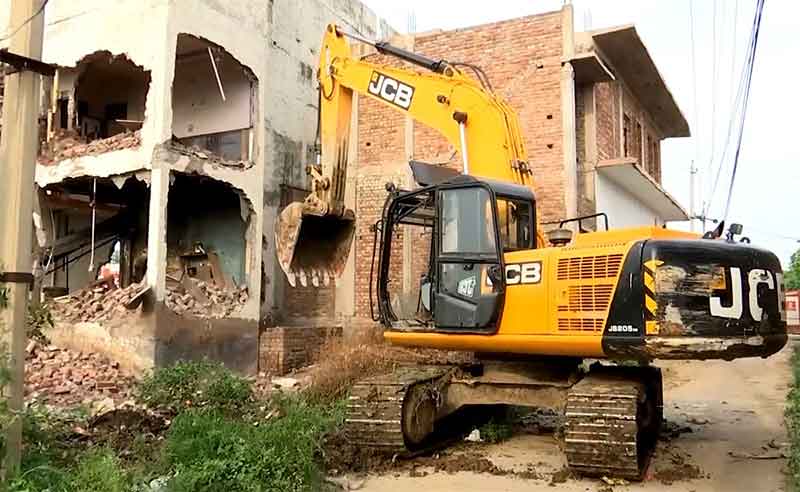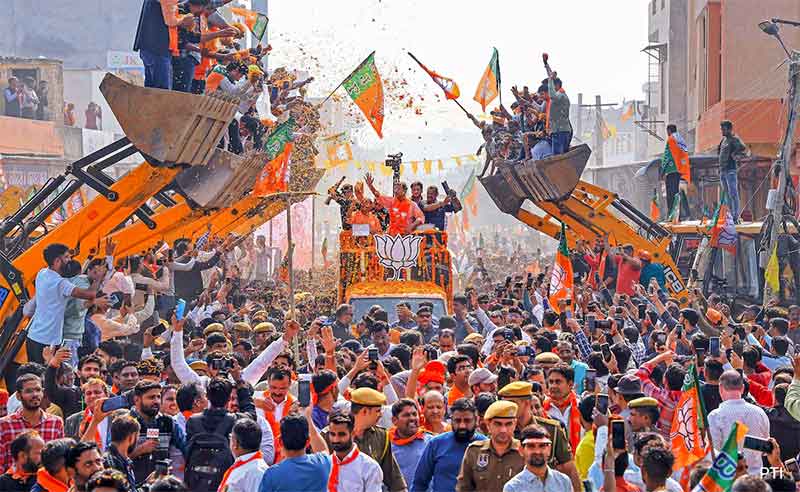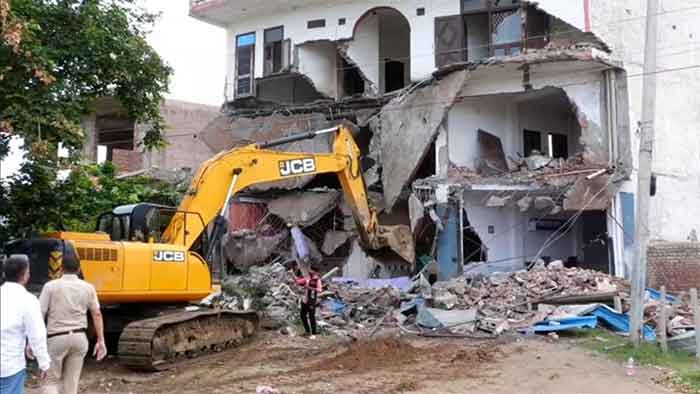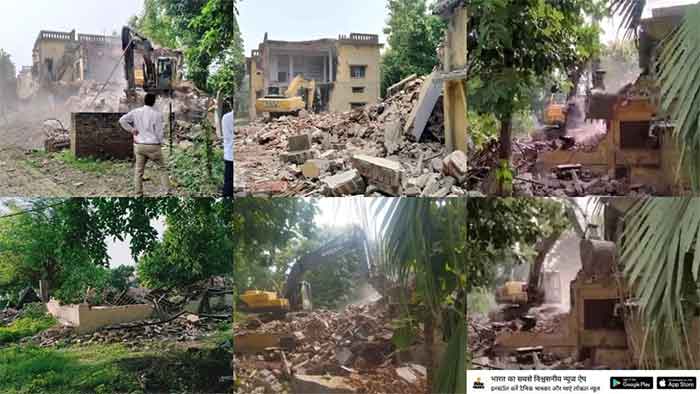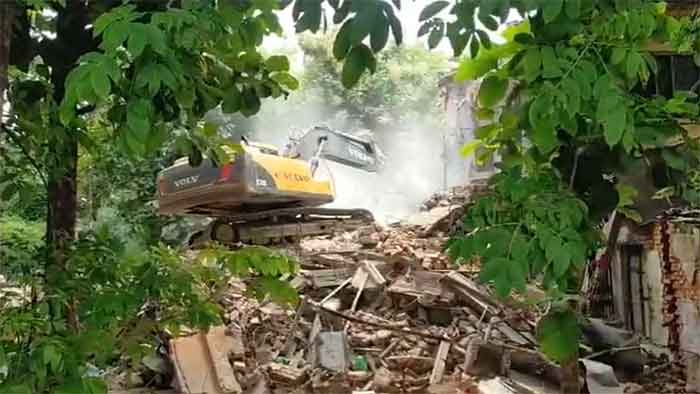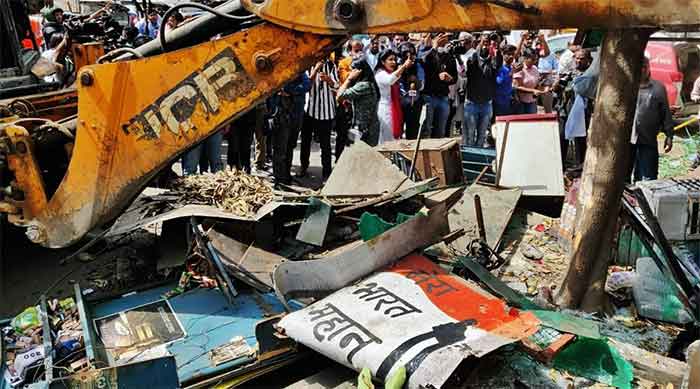
When Boris Johnson, the British Prime Minister was posing for pictures, adventurously sitting atop a bulldozer in the new JCB factory inaugurated recently in Gujarat, little did he realise (or, did he deliberately choose to ignore?) that only a few days earlier, similar bulldozers were deployed by the local authorities to demolish buildings in the Jahangirpuri colony in New Delhi in what could be termed as an act of selective coercion, a matter that has attracted judicial scrutiny at the highest level (https://thewire.in/government/ignorant-amnesty-slams-boris-johnsons-visit-to-jcb-factory-amidst-demolitions)
Bulldozer politics:
Strangely, bulldozers have acquired considerable fame of late, as they symbolise “strong leadership” in politics, a euphemism for a leadership that is largely Bhakti-based, that takes unilateral, disruptive, but essentially populist decisions, insensitive to whether they result in human rights violations and indifferent to whether they are legally correct or not. The justification put forward by the Bhakts and arrogantly presumed to be so by the leader is that he or she knows what is best for the people, that the due process of law causes inordinate delays in decision making and, in any case, it is no more than a vexatious irritant which could and should be ignored. After all, the Bhakts who see a divine spirit in their leader look forward to instant justice being delivered, as perceived by the leader. They have no faith in the well-established principle of jurisprudence “that a person accused of a crime is considered innocent until proven guilty”. A strong leader is, in their perception, one who is the “judge, the jury and the executioner”, who summarily assumes that a person accused of a crime is guilty, till he or she is proven innocent, and therefore that person should be punished firmly and quickly, irrespective of whether the accused would be convicted eventually by the trial court or not. In an environment like this, populism trumps legality and the judicial institutions which are responsible for delivering justice become ineffective. The message that the leader conveys by passively giving a nod to acts of violence permeates downwards, forcing the administration below to fall in line and turn a blind eye to illegal acts of violence. Sometimes, the message is so compelling that even institutions, which are expected to function independently, discreetly choose to fall in line with it.
In the State where bulldozers were first deployed innovatively to deliver such ready justice, the leader had been publicly acclaimed as the “bulldozer baba” (https://economictimes.indiatimes.com/news/politics-and-nation/yogi-adityanathbulldozer-baba-comes-back-stronger/articleshow/90442841.cms). No wonder he has come back to power with a thumping majority in the recently concluded Assembly elections, which establishes the fact that in a democracy revolving around the Bhakti cult, irrespective of whether the leader’s decisions are legal or illegal, it all depends on how his admirers, who command the majority of the electorate, perceive them. These days, elections are fought, less on the basis of concern for good governance, and more on the basis of electoral engineering that tends to polarise the electorate in terms of their caste, religion etc. Such polarisation compounded by a frenzy of ultra-nationalism can tilt the electoral process decisively in favour of strong leaders who predominantly thrive on divisive politics.
Recognising the resounding success of such bulldozer politics, yet another leader has since decided to deploy the ubiquitous bulldozer to cut the vexatious red tape of Constitutional constraints to emulate his worthy colleague. He has acquired the honorific title of “Bulldozer Mama”, a sure and certain way to win the Assembly elections due to take place in that State shortly.
To show that there is no dearth of Bhakts in India’s capital city, New Delhi, the seat of the Parliament, policed directly by the central leadership itself, the local authorities brought in their own bulldozers to demonstrate how an act of selective coercion could deliver justice, in terms of its populist definition. The recent demolitions in the Jahangirpuri colony in Delhi have since hit the headlines. There are several illegally constructed buildings in the other parts of Delhi, thriving for decades, where bulldozers cannot go for bringing them down, as they belong to the high and the mighty of the nation. Article 14 of the Constitution bestows on the citizen the right to “equality before law” but in India, some are more equal than the others.
When encroachments obstruct the right of way, they are rightly considered objectionable but, in the case of the encroachments in colonies such as Jahangirpuri, they have been there for decades, with the local officials tacitly allowing them to come up and proliferate. The encroachers, in some cases, belong to the low-income sections of the society and they have set up their small businesses to earn their daily livelihoods. Had the local administration rehabilitated them elsewhere in such a way that they could pursue occupations that enable them to live in dignity, they would not have chosen to erect structures that block the right of way. After allowing them to set up their marginal businesses for decades, if the administration wakes up overnight, issues them routine notices and brings bulldozers to efface their shops ruthlessly, it certainly amounts to outright mis-governance. What the administration ought to have done is to identify alternate locations of rehabilitation in consultation with them, ensure that their livelihoods do not get disrupted and given them reasonable time to move to the new locations in a calibrated manner. The administration should have followed such a well thought out plan of action in the case of each and every encroacher in Jahangirpuri, whether it is a medium sized shop or a roadside hawker or a pavement dweller.
There are progressive laws in force to safeguard the interests of small roadside businesses such the Street Vendors (Protection of Livelihood and Regulation of Street Vending) Act, 2014, which the local administration, eager to please their superiors and anxious to show their unstinted allegiance with the mindset of the strong leader, had chosen to ignore altogether.
In their landmark judgement in the 1985 Olga Tellis case, the apex court had laid down the norms to be complied with for rehabilitating the pavement dwellers of Mumbai. These norms are applicable everywhere. Had the Jahangirpuri officials chosen to comply with the same, the outcome would have been vastly different.
There are larger questions of governance arising in dealing with objectionable encroachments, as in the case of the Jahangirpuri colony.
As already indicated, objectionable encroachments would not have taken place without the concerned officials turning a blind eye for a long time. Have the authorities cared to identify the officials responsible for allowing the encroachments to come up in the first instance and proceed against them? If no disciplinary action is taken against those officials, the overnight frenzy of evictions of the kind that took place in Jahangirpuri become highly suspect. In addition, there are thousands of encroachments in different parts of Delhi, which are far more egregious than their counterparts in Jahangirpuri, the encroachers in those cases being politically and economically much more influential. If no action has been taken against them, the Jahangirpuri evictions certainly amount to outright discrimination. If such discrimination is specifically directed against a particular section of the society, it becomes all the more indefensible. These are matters that call for an independent scrutiny.
Encounter killings:
Another index of strong leadership, as perceived by some, is the use of brute force to suppress crime. This includes, among others, elimination of dreaded accused persons in “encounters”, a euphemism for extra-judicial killings, without the accused being duly tried by a court and convicted as per the law.
According to the information provided by the Union Home Ministry to the Parliament on February 8, 2022, out of an all India total of 655 encounter killings, 117 of them took place in the UP during the calendar years 2017-21, extending into January, 2022. Once an accused is eliminated, there is no longer the necessity of the case being investigated, the required evidence being gathered and judiciously evaluated before a trial court and the court pronouncing its verdict. One never knows whether the evidence gathered by the police against the accused in the case of an encounter killing is adequate to establish his guilt. For all we know, he could be innocent. It suits the investigating officer to eliminate an accused person, as it would save his time and effort. These days, awards and promotions are given to incentivise police encounters. Such incentives could encourage the officers to report even false encounter killings deliberately as genuine killings committed by the police in self-defence. In fact, encounter killings alleged to be false continue to pour in.
To prevent wanton extra-judicial encounter killings, both the apex court and the NHRC have laid down stringent norms to be adopted in the case of every single encounter. In reality, the police officials are reluctant to comply with those norms. It is rare that an encounter killing is found to be false and the concerned officers duly punished.
It is the contention of the police that encounter killings are forced upon the officers to defend themselves against attacks by the criminals. There is also a perception among the public that such killings demonstrate the resolve of the police to deliver instant justice and improve the law and order situation. If that were to be so, in those States that account for large numbers of encounter killings, the law and order situation ought to improve significantly. In reality, the statistical information provided by the National Crime Records Bureau does not corroborate that premise. In the States which account for large numbers of encounter killings, atrocities against women, dalits and minorities continue to take place again and again, without any respite.
Detention of ‘foreigners”::
These days, since ultra-nationalism has proved to be an outright election-winner, the term “foreigner” has assumed special significance. Special laws have been brought in to appease the ultra-nationalists. These laws confer discretionary powers on the local officials to identify a person as a suspected “foreigner” and take coercive action. As usual, it opens the floodgates to detaining citizens on the ground that they could be foreigners and forcing them to languish in jails indefinitely. Those who are detained usually belong to the disadvantaged sections of the society, who are far too helpless to defend themselves. They remain in jails for years till some public-spirited lawyers come to their help, take up their cases before the local courts and get them bailed out. Meanwhile, their livelihoods would have got disrupted and their children would have stopped going to schools. There is no way for them to get compensated for this loss, as and when they are found innocent.
To cite a specific example, a young rickshaw puller in Assam and his wife were arrested in June, 2019, merely on a suspicion that they were “illegal foreigners” and were forced to be in detention for one and a half years. In the absence of any help, they had no other option than to withdraw their children, aged 5 years and 7 years, from the school, so that they could look after them in the jail. Though the first detainee was born in Assam and his grandparents’ names figured in the National Register of Citizens (1951) and his father was a registered voter as early as in 1965, the authorities concerned had never cared to ascertain the facts. In the detainee’s words, “We are both unlettered and were in no position to make sense of the documents or what we were supposed to do”. They could not afford to engage a lawyer to plead their case while in detention. Fortunately, a few activist lawyers came to their help and moved the High Court to intervene and absolve them of the offence, which resulted in both of them being declared as “Indian citizens”, after they had already spent one and a half years in jail. (https://indianexpress.com/article/north- east-india/assam/assam-nrc-detention-centre-7128303/). It is doubtful whether they will ever be compensated for the loss of their personal liberty, loss of educational opportunities for their children and for the trauma they had to undergo. It is equally doubtful whether the officers responsible for their wrongful detention will ever be held accountable and duly penalised (https://countercurrents.org/2021/10/undertrials-for-how-long-guilty-till-proven-innocent/).
Draconian laws against foreign citizens would not have got enacted in the first instance without the political executive consciously pushing them forward for gaining electoral mileage. The police would not have resorted to arresting persons on a mere suspicion in such cases, had not the ruling political elite tacitly encouraged them to do so.
Arrests made under security-related laws:
Another example of a strong leadership turning the principle, “innocent till proven guilty” upside down is the range of highly regressive anti-terrorist laws enacted by the political leadership in India from time to time. Whether it is the Unlawful Activities Prevention Act (UAPA), or the Public Safety Act (PSA), persons can be held indefinitely, without their being subject to a trial, pending “investigation” by the concerned agency responsible for their detention. An investigation can go on for years unchecked, while those incarcerated will continue to remain deprived of their right to personal liberty and their right to be duly tried by a judicial authority. Often, the accused spend years in jails as “undertrials” and the line between detention prior to conviction and detention following conviction gets blurred. In case they are finally found innocent and set free by the courts, rarely the State compensates them for the loss of their liberty and rarely the investigating officers held accountable for the shoddy and delayed investigation. There are no formal institutional arrangements today to compel the State to provide compensation in such cases.
In the Bhima Koregaon case, for example, since June 2018, 16 persons, including Stan Swamy, an activist campaigning for the tribals in Jharkhand, had been arrested and charged under several sections of the UAPA (https://thewire.in/rights/bhima-koregaon-case-trying-without-a-trial- is-the-intent-of-draconian-uapa-law). Stan Swamy died in custody on July 5, 2020, without ever being found guilty. The genuine concerns he had expressed about the rights of the tribals continue to remain unanswered (https://countercurrents.org/2021/07/fr-stan-swamy-has-expired- but-his-questions-havent/). It is ironic that those in authority who continued to violate the tribal laws should go scot free, while those who raised concerns had to pay the price (https://countercurrents.org/2021/10/undertrials-for-how-long-guilty-till-proven-innocent/)
According to the information provided by the Union Home Ministry on March 9, 2021 in the Lok Sabha, during the years 2015-19, 7,050 arrests were made by the authorities in different States under the UAPA alone. Most of those arrested are still awaiting their trial. Since 2019, the Jammu and Kashmir (J&K) administration has booked over 2,300 people in more than 1,200 cases under the UAPA and also another 954 people under the Public Safety Act (PSA). Out of them, 46 per cent of those booked under the UAPA and about 30 per cent of those detained under the PSA are still in jail, both inside and outside J&K, without the prospect of an early trial. (https://indianexpress.com/article/india/2300-booked-under-uapa-in-jk-since-2019-nearly-half-still- in-jail-7438806/).
It is ironic that in the case of those held under the UAPA, the PSA and the other preventive detention laws, they are considered guilty till they can prove their innocence, a situation that is totally at odds with the well-established legal maxim, “the burden of the proof lies upon him who affirms, not he who denies”. It is equally ironic that politicians facing grave criminal charges can contest elections, get elected and occupy positions of public authority, on the ground that, in the absence of conviction by a court, they are deemed to be innocent.
One should never find fault with the State’s concern for protecting the national security and preventing violence If someone has indeed incited violence and that person’s guilt has been established beyond all reasonable doubt through a formal judicial process, he or she shall have to face punishment in accordance with the relevant laws in force. In the case of the undertrials referred above, that is not the case. It is the investigating agencies that have caused detention of the accused on suspicion and made sure that they remained in detention for a prolonged duration on the ostensible ground that the investigations were are still in progress. Further, there are also delays in the judicial proceedings for one reason or another. Whatever be the reasons, those at the receiving end are the accused persons whose personal liberty remains curtailed indefinitely, in a patently unjust manner. The fact that a person accused of posing a threat to the national security should remain jailed indefinitely, while the investigating agency takes its own sweet time to bring the investigation to its logical end, does not behove a healthy democratic system. If it is indeed a case of safeguarding the national security, it is all the more necessary that investigation is put on a fast-track and completed at the earliest.
Arrests by the Central investigating agencies:
Successive governments have done their own bit to weaken the Central investigating agencies and misuse them against the opposition at any given point of time. In the recent times, this tendency has gained momentum and the agencies have been used more and more to shift their focus from their normal work to take up and pursue cases against the political leaders in opposition. It is commonplace these days to find the Central agencies arresting those who oppose the ruling political elite and ensuring that they remain in detention indefinitely. On the other hand, the same agencies have not acted in a similar manner in cases involving far graver offences. They would not have resorted to selective arrests without an assenting nod from the political executive.
Expediting investigations:
Unless the investigating agencies are de-politicised fully, delays and bias in investigation would continue and the accused would continue to remain in detention for long periods. The judicial system is also hamstrung because their strength has got depleted as a result of the government not helping them to fill up vacancies. If the vacancies can be filled up, it will go a long way towards expediting the judicial process Fast track courts could be set up to speed up the process further. The fact that such measures are taken indicates the reluctance of the political executive to bring about administrative improvements in the judicial system.
Is it going to be the shape of things to come?
It is relevant to recall in this connection the prophetic words of Dr B R Ambedkar in his historic address to the Constituent Assembly on November 25, 1949:
“in India, Bhakti or what may be called the path of devotion or hero-worship, plays a part in its politics unequalled in magnitude by the part it plays in the politics of any other country in the world. Bhakti in religion may be a road to the salvation of the soul. But in politics, Bhakti or hero-worship is a sure road to degradation and to eventual dictatorship”
When the government is truly “of the people, by the people, and for the people” as it ought to be in a genuine democracy, there can be no place for hero worship. Democracies tend to degenerate into dictatorships when personalised politics overtake participative decision making. Genuine democratic systems alone can ensure long-term, people-oriented development.
The use of bulldozers in open defiance of the due process of law, resorting to extra-judicial encounter killings as the means to enforce law and order, detaining citizens summarily for expressing views not in line with those of the political executive and wantonly delaying investigation to prolong such detention are all symptoms of the cult of a Bhakti-based strong leadership. In a socio-political milieu that arises from it, institutions tend to get compromised, administration forced to fall in line and the society tends to get highly polarised on lines of caste, religion, ultra-nationalism etc. Religious zealotry then replaces the nobler and the more profound thinking that all religions propagate. Superstitions overtake scientific approaches. Unruly mobs dictate terms to the administration and influence the electoral process. In the ultimate analysis, the nation’s precious time and resources tend to get frittered away in the pursuit of unproductive activities that will only inhibit progress and socio-economic development.
Should such a situation be allowed to develop further and permeate the society?
If this is what is in store for the people, it is time for each one of us to wake up, ponder over this question and act before it is too late.
E A S Sarma, Former Secretary to Government of India

